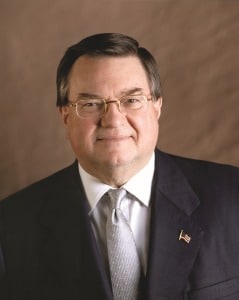
In every issue of Radio Ink in 2016, we’re taking a look back at the 1996 legislation that changed the radio industry. The 1996 Telecommunications Act spawned deregulation, and to this day the debate rages on about whether radio is better off as a result.
At the center of the deregulation charge was the National Association of Broadcasters. The lobbying organization for both radio and TV had its marching orders: Push hard for deregulation. Eddie Fritts was the NAB’s CEO at the time, and he was tasked with getting his organization to lobby lawmakers for the loosened regulation that would bring more consolidation. Here’s a look back at the Telecommunications Act of 1996 with Eddie Fritts.
RI: Back in the early ’90s, was the support for deregulation unanimous among radio groups?
Fritts: We didn’t hear opposition from the radio side. I don’t think anyone ever imagined the passage of this would lead to as much deregulation of ownership on the radio side as, in fact, it did. At that time, no one really had a vision of how big some of the national radio companies could be. Therefore, there was really no outright opposition to relaxation of radio rules within our board.
RI: Something that seems to be forgotten is that there were a lot of radio stations struggling to survive before deregulation.
Fritts: Oh, yeah. Absolutely. Part of the rationale for deregulation was that it would allow additional consolidation so that some of those struggling stations could work within stronger companies.
RI: What was the buying and selling activity like when it was finally passed?
Fritts: As compared to before, there was certainly a big increase in activity. I don’t think, in the first year or two, anyone realized what total deregulation would mean in the marketplace. A few pioneers led the way and took advantage of the relaxation of the rules and formed rather substantially large companies. Radio, prior to that time, was not aggregated to the point where you could have substantially large companies out of a radio group. You could have good, strong companies, but not necessarily nationwide large numbers of stations, which we evolved to.
RI: What was the most positive aspect of the act?
Fritts: There were restrictions on the numbers of stations that a group could own, and those were essentially eliminated.
RI: Is there something that stands out as a negative?
Fritts: Some broadcasters would say that is the negative. You still have a division between small and large. It just amplified. I think it has more to do with market size than it does with group size.
RI: As you look back now, would you say the Telecom Act was good or bad for radio?
Fritts: Well, you’ve seen the emergence of large companies, and most of the time they were buying out struggling companies as they consolidated. From that standpoint, it was obviously good. From the standpoint of competition, there is certainly less competition among the major companies, certainly in major markets, than perhaps there would have been. Some would argue the other side of it and say there is still too much regulation.
I think the art of compromise is that you find a middle ground. Frankly, my view was that the largest impediment towards total deregulation was Senator Fritz Hollings. I think we described it back at the time: By the time he was through working on the television rules, or at least his staff was, he sort of ran out of bullets to apply the same type of restrictions on radio.
RI: What do you recall about Hollings that was causing him to be a roadblock?
Fritts: The 1951 gubernatorial election in South Carolina was what he referred to frequently; it was the equal-time rules. He said, because of that, he got elected governor of South Carolina. That’s why he wanted to keep as many restrictions as possible on television. But there was clearly a movement afoot led by the NAB and others to have relaxation of the rules and let the marketplace work. In the final analysis, I think that’s what happened.
RI: Can you believe it’s been 20 years? Have we missed anything?
Fritts: I am sure I missed a lot, because it’s 20 years ago and I am 20 years older. I do remember the political fights and I remember going to the signing of the bill at the Library of Congress and Al Gore’s involvement. He was sort of deputized by President Clinton to take over the FCC and everything under their jurisdiction as well. I would say he had a big role to play.








